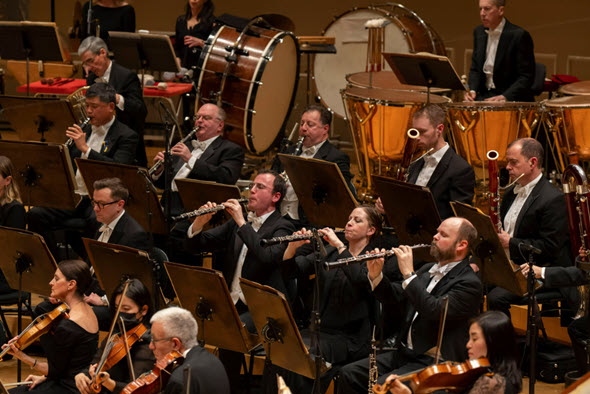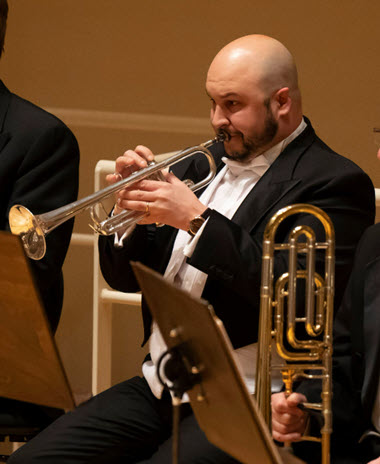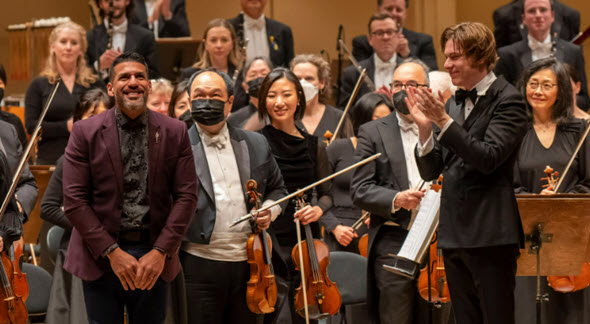As meteoric young conductor returns to CSO, young listeners roar promise at Orchestra Hall

Finnish conductor Klaus Mäkelä led the CSO in a performance of Mahler’s Fifth Symphony. (Photos by Todd Rosenberg)
By Lawrence B. Johnson
The roof-raising roar spoke volumes about the Chicago Symphony Orchestra’s concert with the swiftly ascending young Finnish conductor Klaus Mäkelä on Feb. 16. In no small part, the stormy ovation that followed Mahler’s Fifth Symphony was just one more shockwave engendered by this phenomenal 27-year-old conductor wherever he goes. But the joyful noise was about other things, too.
Maybe the Covid curse, which for so long has depressed everyone and everything, has lifted. The audience at Orchestra Hall was back in force. Better still, the pitch and sheer exuberance of that sound carried the distinct resonance of youth. The place was awash with young people: teenagers, twentysomethings. They were dead silent through the brilliant 72-minute flight of Mahler’s symphony. But the instant Mäkelä cut off that last ripping chord, the place went nuts. And as the conductor began acknowledging individual players, the tumultuous woo-hoo only gained power. It was scarcely less exhilarating than the music itself.
And that grand racket was wholly warranted. The Chicago Symphony, shepherded through the last 13 seasons by Riccardo Muti, who steps down as music director in June, had just delivered a performance of great finesse, beauty and power. The people in the seats heard that, got that – and as much as anything, their eruption surely signaled pride of ownership. The Chicago Symphony is about to see new artistic leadership; if that whole-hearted audience embrace is any indication, the orchestra is also reaching a new generation of listeners, patrons, owners.
The Chicago Symphony needs a trophy case or perhaps championship banners to display its many Mahlerian triumphs. Alas, the singular experience of hearing music live, in the space and in the moment, can only be preserved in memory. Mäkelä’s Mahler Fifth was one for the memory bank.
Broadly speaking, what made the performance so extraordinary came down to two factors: tempo and voicing, which might also be called pulse and clarity. Even by Mahler’s standard, Symphony No. 5 in C-sharp minor offers a staggering display of contrapuntal voice-weaving, especially the mirthful scherzo and the long, effervescent, take-no-prisoners finale. It’s jaw-dropping marvelous stuff, and Mäkelä spun it all out with crystalline transparency and an unfailing sensibility for the music’s swell and flow.
But no less magical was the symphony’s independently famous slow movement, marked Adagietto, for strings and harp only. Just as the woodwinds and brass lit up the scherzo and finale, the CSO strings brought a luminous sheen to this music of disarming warmth and tenderness.
What lay in store in Mahler’s ample hour was proclaimed in golden notes by trumpeter Esteban Batallan’s opening fanfare – the spark that set off a great orchestral crash, and the commencement of a wild and mesmerizing journey. All ending in that mad ovation.
Mäkelä’s program began with Sibelius and then, as it were, Sibelius 2.0. The former was “The Swan of Tuonela,” the ever-popular tone poem evoking the underworld (Tuonela) of Finnish myth. Mäkelä’s spacious, mystical take on the piece allowed generous space for the mournful eloquence of Scott Hostetler’s English horn.
When Sibelius was in middle age, he simply stopped composing and never resumed. But his last works suggest a direction, a new stylistic arc, that seems to be projected into the present by Peruvian-born composer Jimmy López Bellido’s masterful and indeed gorgeous tone poem “Aino,” a CSO co-commission that received its U.S. premiere in this concert.
Aino is a young girl who has been given away in a marriage transaction. Horrified at the prospect, she wanders to the water’s edge and finds sympathetic maidens who dwell beneath the waves. Aino, seeing a happier option to her plight, joins them for eternity. López Bellido, who lived for a time in Finland, has constructed a tone picture of shimmering lyricism that reaches a crest of towering strength. Distinct echoes of late Sibelius give way to piquant harmonies and vibrant orchestral colors as this melancholy narrative rolls toward its transformative consummation.
Mäkelä and the CSO conjured a bright, surging saga without words, and López Bellido was on hand to share in a boisterous ovation.




